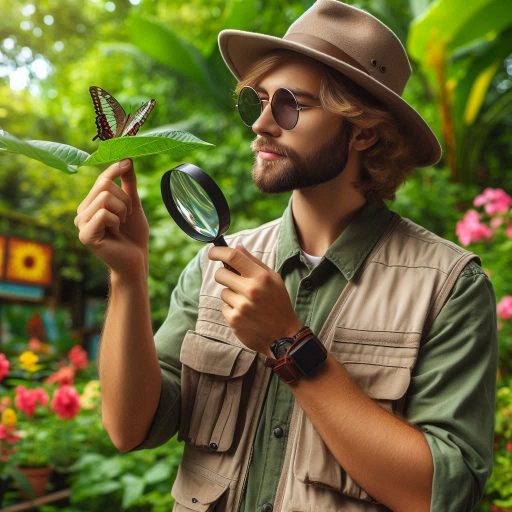Introduction
Zoology, a branch of biology, studies animals and their interactions with ecosystems.
Zoologists research animal behavior, genetics, physiology, and ecology to understand life‘s diversity.
Specialization in zoology is essential for advancing scientific knowledge and addressing ecological challenges.
Specializing allows zoologists to focus on specific fields like conservation biology, marine biology, or entomology.
This focus deepens expertise, leading to new discoveries and solutions for preserving wildlife.
For example, specialists in evolutionary biology explore how species adapt and diversify over time.
Meanwhile, ecologists study interactions between organisms and their environments, contributing to better habitat management.
Choosing a specialization enables zoologists to make significant contributions to both research and practical conservation efforts.
Their work helps protect endangered species, manage ecosystems, and understand complex biological processes.
These contributions improve our ability to sustain biodiversity and mitigate environmental damage.
Zoology offers a broad range of fields, each with unique research opportunities.
Specializing opens doors to diverse career paths, from academic research to applied conservation work.
By focusing on a particular area, zoologists can drive impactful change in the study and protection of wildlife.
This post introduces various zoology specializations, highlighting their importance and opportunities for aspiring zoologists.
Evolutionary Biology
Study of the processes that resulted in the diversity of life on Earth
Evolutionary biology is a fascinating field focused on the processes that drive the diversity of life on Earth.
This branch of zoology examines how species evolve over time and adapt to their environments.
Understanding these processes helps scientists uncover the intricate relationships among various life forms.
Understanding the evolutionary relationships and mechanisms driving species diversification
One primary focus of evolutionary biology is to understand the evolutionary relationships among species.
Researchers use phylogenetic analysis to study how different species are related through common ancestors.
This analysis provides insights into the history of life on Earth.
By constructing evolutionary trees, scientists can visualize the connections between various organisms.
Evolutionary mechanisms play a crucial role in species diversification.
Natural selection, genetic drift, and gene flow are key processes that drive evolution.
Natural selection favors traits that enhance survival and reproduction.
Over time, this can lead to the emergence of new species, a process known as speciation.
Research on adaptation, speciation, and phylogenetics
Adaptation is another important concept in evolutionary biology.
Organisms adapt to their environments through various mechanisms.
These adaptations can be structural, physiological, or behavioral.
For example, certain animals develop physical traits that help them thrive in specific habitats.
Others might change their behavior to enhance survival in changing environments.
Researchers in evolutionary biology also study speciation events.
Speciation occurs when populations evolve to become distinct species.
Understanding the factors that lead to speciation helps scientists identify the processes that create biodiversity.
For instance, geographic isolation can lead to divergent evolution.
This isolation can cause populations to adapt to different environments, ultimately resulting in new species.
Phylogenetics is essential in evolutionary biology.
It involves analyzing genetic data to infer evolutionary relationships among species.
Molecular techniques allow scientists to compare DNA sequences across different organisms.
This analysis provides a clearer picture of how species have evolved over time.
The field of evolutionary biology is critical for conservation efforts.
Understanding evolutionary processes helps scientists make informed decisions about protecting endangered species.
It also aids in preserving genetic diversity, which is vital for species resilience.
Evolutionary biology offers valuable insights into the diversity of life on Earth.
By studying evolutionary relationships, mechanisms, and adaptation, researchers contribute significantly to our understanding of biodiversity.
This knowledge is essential for conservation and the sustainability of ecosystems.
As we continue to explore evolutionary biology, we unlock the secrets of life‘s history and the intricate web of connections that define our planet’s living organisms.
Ecology
Study of interactions between organisms and their environment
Ecology is the study of interactions between organisms and their environment.
This branch of zoology examines how living things relate to each other and their surroundings.
Ecologists analyze these interactions to understand ecosystems and their dynamics.
They investigate how various factors influence species survival and adaptation.
Focus on ecosystems, conservation biology, population dynamics, and biodiversity
Ecology encompasses several key focus areas, including ecosystems and conservation biology.
Ecosystems are complex networks of living organisms and their physical environments.
Each ecosystem has unique characteristics that influence the organisms within it.
Conservation biology aims to protect and preserve these ecosystems and their biodiversity.
Population dynamics is another important aspect of ecology.
It involves studying how populations of organisms change over time.
Ecologists analyze birth rates, death rates, and migration patterns to understand population trends.
This research helps identify factors that influence population stability or decline.
Biodiversity is a critical component of ecological studies.
High levels of biodiversity contribute to ecosystem resilience.
Ecologists study the variety of species in ecosystems and their roles within them.
They also assess the impacts of human activities on biodiversity.
This knowledge informs conservation efforts and helps protect endangered species.
Research on behavior, habitat selection, and ecological processes
Ecologists research various behaviors exhibited by organisms in their natural habitats.
Understanding behavior provides insights into how species interact with their environment.
For example, animals may exhibit territorial behavior to secure resources.
Others might engage in cooperative behaviors for survival.
Habitat selection is another focus of ecological research.
Organisms choose habitats that meet their needs for food, shelter, and breeding.
Ecologists study these choices to understand the factors influencing habitat preference.
This research can reveal how changes in the environment impact species distribution.
Ecological processes are fundamental to understanding ecosystems.
These processes include energy flow, nutrient cycling, and species interactions.
Ecologists study how energy moves through food webs and the roles of producers, consumers, and decomposers.
This research highlights the interconnectedness of species and their environments.
Ecology also addresses the impacts of climate change and habitat destruction.
As human activities alter ecosystems, ecologists strive to understand the consequences.
They study how species adapt to changing conditions and the potential for extinction.
This research is vital for developing effective conservation strategies.
Ecology plays a crucial role in understanding the interactions between organisms and their environments.
By studying ecosystems, conservation biology, population dynamics, and biodiversity, ecologists contribute significantly to our knowledge of life on Earth.
Their research on behavior, habitat selection, and ecological processes enhances our understanding of how to protect and preserve ecosystems.
This knowledge is essential for ensuring a sustainable future for both wildlife and humans.
Read: Preparing for a Botany PhD: Tips and Advice
Physiology
Study of how organisms function at the molecular, cellular, and organismal levels
Physiology is the branch of biology that studies how organisms function.
It examines processes at molecular, cellular, and organismal levels.
By understanding these functions, physiologists gain insights into the mechanisms that sustain life.
This knowledge is crucial for various applications, including medicine, ecology, and animal husbandry.
Focus on metabolic processes, organ systems, and physiological adaptations
Physiology focuses on several key areas, including metabolic processes.
Metabolism involves all chemical reactions that occur within an organism.
These reactions provide energy necessary for growth, reproduction, and maintenance.
Physiologists study how organisms convert food into energy and how they utilize it efficiently.
Another important aspect is the study of organ systems.
Organ systems consist of groups of organs that work together to perform specific functions.
For example, the circulatory system transports nutrients and oxygen to cells.
The respiratory system facilitates gas exchange, while the digestive system processes food.
Understanding these systems helps physiologists evaluate how organisms maintain homeostasis.
Physiological adaptations are critical for survival in varying environments.
Many organisms develop unique adaptations to thrive in specific conditions.
For instance, some animals have specialized mechanisms to conserve water in arid environments.
Others possess adaptations that allow them to tolerate extreme temperatures.
By studying these adaptations, physiologists uncover how species evolve over time.
Research on physiological responses to environmental changes and stressors
Physiologists also investigate how organisms respond to environmental changes.
These changes may include variations in temperature, humidity, or availability of resources.
Physiological responses can be acute or chronic, depending on the stressor’s intensity and duration.
For instance, when exposed to extreme heat, some animals exhibit behavioral changes or physiological adjustments to prevent overheating.
Research on stress responses is particularly important for understanding animal welfare.
Physiologists study how chronic stress impacts health and behavior.
By identifying these stressors, researchers can develop strategies to enhance animal well-being.
This knowledge is applicable in agriculture, wildlife management, and veterinary medicine.
Additionally, physiologists explore how organisms adapt to environmental stressors over generations.
This research informs conservation efforts, particularly for species facing climate change.
Understanding the physiological limits of organisms helps predict their potential for survival in changing environments.
Physiology is essential for understanding how organisms function at various levels.
By focusing on metabolic processes, organ systems, and physiological adaptations, physiologists contribute significantly to biological knowledge.
Their research on physiological responses to environmental changes and stressors enhances our understanding of life.
This knowledge is vital for addressing challenges in health, conservation, and animal welfare.
As researchers continue to explore the complexities of physiology, they uncover important insights that inform various scientific fields and practical applications.
Read: Interdisciplinary Research: Botany and Other Sciences
Ethology
Study of animal behavior in natural environments
Ethology is the scientific study of animal behavior in natural environments.
Ethologists observe animals in their habitats to understand how they behave.
This approach emphasizes the importance of context in shaping behavior.
By studying animals in their natural surroundings, researchers gather valuable insights into their interactions with the environment.
Focus on innate and learned behaviors, social interactions, and communication
Ethology focuses on two primary types of behaviors: innate and learned.
Innate behaviors are instinctual and genetically programmed.
These behaviors occur without prior experience or learning.
For example, many birds instinctively build nests using specific materials.
Such behaviors are crucial for survival and reproduction.
Learned behaviors, on the other hand, develop through experience and interaction with the environment.
Animals learn from their parents, peers, or through trial and error.
For instance, young primates often learn foraging techniques by observing their mothers.
Understanding both types of behavior helps ethologists explain how animals adapt to their surroundings.
Social interactions play a significant role in ethological research.
Many species exhibit complex social structures, influencing their behavior.
Ethologists study how animals communicate and establish relationships within their groups.
This includes examining vocalizations, body language, and other signaling methods.
Social behavior impacts survival and reproductive success, making it a vital area of study.
Research on mating systems, foraging strategies, and territorial behavior
Ethology also investigates specific behaviors related to reproduction, foraging, and territory.
Mating systems vary widely among species.
Some animals are monogamous, while others exhibit polygamous or promiscuous behaviors.
Ethologists study these systems to understand reproductive strategies and mate selection.
Factors such as environmental conditions and resource availability influence mating choices.
Foraging strategies are another critical focus of ethological research.
Animals employ various techniques to locate and acquire food.
Some species use cooperative foraging, while others rely on solitary tactics.
Ethologists observe these strategies to identify the most effective methods for different species.
Understanding foraging behavior helps researchers assess the ecological dynamics of various habitats.
Territorial behavior is also an essential aspect of ethology.
Many animals establish and defend territories to secure resources and attract mates.
Ethologists study how animals mark their territories and interact with intruders.
This research reveals the role of territory in social hierarchies and population dynamics.
Additionally, understanding territorial behavior aids in conservation efforts.
Ethology provides valuable insights into animal behavior in natural environments.
By focusing on innate and learned behaviors, social interactions, and communication, ethologists deepen our understanding of wildlife.
Their research on mating systems, foraging strategies, and territorial behavior contributes to the field of biology.
As scientists continue to explore the complexities of animal behavior, they enhance our knowledge of ecological interactions and the evolution of species.
This knowledge is crucial for conservation efforts and managing human-animal relationships.
Read: Women in Botany: Celebrating Pioneers and Leaders

Paleontology
Study of prehistoric life through fossils
Paleontology is the scientific study of prehistoric life through fossils.
Paleontologists analyze the remains of ancient organisms preserved in sedimentary rock.
Fossils provide a wealth of information about past life forms and their environments.
This study helps scientists understand the history of life on Earth.
Focus on reconstructing the evolutionary history of organisms
Paleontologists focus on reconstructing the evolutionary history of organisms.
They examine fossil records to identify relationships among species.
This process involves determining how species evolved over time.
By analyzing morphological and genetic data, paleontologists create evolutionary trees.
These trees illustrate the connections between ancient and modern species.
Fossils can reveal significant evolutionary transitions.
For instance, scientists discovered fossils of early amphibians transitioning from water to land.
These findings showcase the adaptations necessary for survival in new environments.
Understanding these transitions helps researchers grasp the dynamics of evolution.
Research on ancient environments, extinction events, and the origin of major groups of organisms
Paleontologists also research ancient environments.
They study sedimentary layers and fossilized remains to reconstruct ecosystems.
By examining these environments, scientists gain insights into climate conditions and geographical changes.
This research aids in understanding how ecosystems responded to various factors over time.
Extinction events are another critical area of study in paleontology.
Researchers investigate the causes and effects of mass extinctions throughout Earth’s history.
For example, the Cretaceous-Paleogene extinction event led to the demise of the dinosaurs.
Understanding these events helps scientists evaluate the resilience of ecosystems.
Paleontologists examine the origin of major groups of organisms.
They investigate how specific traits and adaptations arose over time.
For instance, studying the evolution of mammals reveals insights into their diversification.
This research informs our understanding of how life adapts to changing conditions.
Paleontology plays a crucial role in understanding biodiversity.
By uncovering the history of life on Earth, paleontologists contribute to our knowledge of current species.
This field of study enhances our understanding of extinction and conservation.
Learning from the past helps guide current conservation efforts.
Paleontology offers valuable insights into prehistoric life.
Through the study of fossils, scientists reconstruct the evolutionary history of organisms.
Their research on ancient environments, extinction events, and organism origins contributes significantly to our understanding of biodiversity.
As scientists continue to explore the fossil record, they uncover the complexities of life on Earth.
This knowledge not only informs our understanding of the past but also aids in predicting future ecological changes.
The field of paleontology remains essential for comprehending the intricate tapestry of life throughout history.
Read: How Climate Change Is Impacting Plant Research
Transform Your Career Today
Unlock a personalized career strategy that drives real results. Get tailored advice and a roadmap designed just for you.
Start NowConservation Biology
Study of preserving biodiversity and protecting endangered species
Conservation biology is the scientific study focused on preserving biodiversity and protecting endangered species.
This field addresses the ongoing loss of species and habitats worldwide.
Conservation biologists aim to understand the factors threatening biodiversity.
They develop strategies to mitigate these threats and promote ecosystem health.
Focus on habitat restoration, captive breeding programs, and policy development
Habitat restoration is a key area of focus in conservation biology.
Scientists work to restore degraded ecosystems to their natural states.
This process often involves reintroducing native plant species and removing invasive species.
Successful habitat restoration can significantly benefit local wildlife populations.
Captive breeding programs also play an essential role in conservation efforts.
These programs help raise endangered species in controlled environments.
After sufficient population growth, biologists reintroduce these animals into their natural habitats.
Captive breeding has successfully saved several species from extinction.
Policy development is another critical aspect of conservation biology.
Conservation biologists work with policymakers to create effective conservation laws and regulations.
They advocate for the protection of habitats and species at local, national, and international levels.
Effective policy helps safeguard biodiversity and promotes sustainable practices.
Research on human impacts on ecosystems, climate change, and invasive species
Conservation biologists research human impacts on ecosystems.
They study how activities like deforestation, pollution, and urbanization threaten wildlife.
Understanding these impacts helps biologists develop strategies to mitigate harm.
Climate change is another significant concern in conservation biology.
Researchers investigate how changing temperatures and weather patterns affect ecosystems.
They examine species‘ responses to climate change and develop adaptive management strategies.
This research is crucial for preserving vulnerable species and habitats.
Invasive species pose a major threat to native biodiversity.
Conservation biologists study the impacts of non-native species on local ecosystems.
They develop strategies to manage and control invasive populations effectively.
This work is vital for protecting native species from competition and predation.
Conservation biology encompasses various interdisciplinary approaches.
Scientists collaborate with ecologists, geneticists, and social scientists.
This collaboration enhances understanding and informs conservation strategies.
Public awareness and education are also critical components of conservation biology.
Conservation biologists engage communities to promote awareness about biodiversity loss.
They provide resources and programs to help individuals contribute to conservation efforts.
Conservation biology is vital for preserving biodiversity and protecting endangered species.
This field focuses on habitat restoration, captive breeding programs, and policy development.
Conservation biologists research human impacts on ecosystems, climate change, and invasive species.
Their work informs strategies to mitigate threats to wildlife and ecosystems.
By promoting awareness and collaboration, conservation biologists strive to create a sustainable future for all species.
Marine Biology
Study of organisms that inhabit marine environments
Marine biology is the scientific study of organisms living in marine environments.
This field encompasses a wide variety of life forms.
Marine biologists investigate the behavior, physiology, and interactions of these organisms.
They explore how marine species adapt to their aquatic habitats.
Marine biology plays a crucial role in understanding ocean ecosystems.
Focus on oceanography, marine ecology, and marine conservation
Oceanography is an essential component of marine biology.
It involves studying the physical, chemical, and geological aspects of the ocean.
Marine biologists use oceanographic data to understand marine life distribution and behavior.
This knowledge helps scientists predict how environmental changes affect marine ecosystems.
Marine ecology focuses on the relationships between marine organisms and their environments.
Researchers study food webs, nutrient cycles, and habitat dynamics.
Understanding these interactions is vital for conserving marine biodiversity.
Marine ecologists examine how various species depend on one another for survival.
Marine conservation is another critical area within marine biology.
This field addresses the threats facing marine ecosystems, such as pollution and overfishing.
Marine biologists advocate for sustainable practices to protect ocean health.
They collaborate with policymakers to develop marine protected areas (MPAs).
These efforts aim to preserve vital habitats and ensure the sustainability of marine resources.
Research on marine biodiversity, marine mammalogy, and coral reef ecosystems
Research on marine biodiversity is a core focus in marine biology.
Scientists document species diversity in various marine habitats.
They assess the ecological roles of different organisms in ocean ecosystems.
This research is essential for understanding the overall health of marine environments.
Marine mammalogy specifically studies marine mammals, including whales, dolphins, and seals.
Marine mammalogists investigate their behavior, physiology, and conservation needs.
They research how human activities impact these animals and their habitats.
This knowledge informs conservation strategies for protecting marine mammals.
Coral reef ecosystems are another vital area of research in marine biology.
Coral reefs support an immense diversity of marine life.
Scientists study the health and dynamics of these ecosystems.
They examine factors such as water quality, temperature, and pollution.
Understanding these factors is crucial for protecting coral reefs from degradation.
Marine biologists also explore the impacts of climate change on ocean ecosystems.
They study ocean acidification, rising sea temperatures, and habitat loss.
This research helps identify vulnerable species and ecosystems.
It also informs strategies for mitigating the effects of climate change.
Additionally, marine biology involves hands-on fieldwork.
Researchers conduct underwater surveys and sampling to collect data.
They analyze specimens and monitor environmental conditions.
This work provides valuable insights into marine life and ecosystem dynamics.
Marine biology is a dynamic field dedicated to studying marine organisms and ecosystems.
It focuses on oceanography, marine ecology, and marine conservation.
Research on marine biodiversity, marine mammalogy, and coral reef ecosystems is essential.
Understanding these complex systems enables scientists to protect and preserve ocean health for future generations.
Entomology
Study of insects and their diversity
Entomology is the scientific study of insects, one of the most diverse groups of organisms on Earth.
Insects make up about 75% of all known animal species.
They inhabit nearly every environment, showcasing remarkable adaptability and resilience.
Entomologists explore the vast diversity of insects, documenting their unique characteristics and behaviors.
This field encompasses the classification and identification of various insect species.
Researchers often categorize insects into groups based on their physical and genetic traits.
Focus on insect classification, behavior, physiology, and ecology
Insect classification is crucial in entomology.
It helps scientists understand evolutionary relationships among different species.
Entomologists use various methods, such as morphological and genetic analysis, to classify insects.
This classification supports research on insect biodiversity and conservation efforts.
Behavior is another important area of study in entomology.
Researchers observe how insects interact with their environment and other species.
They investigate social behaviors in species like ants and bees.
Understanding these behaviors reveals how insects communicate and cooperate for survival.
Physiology is also significant in entomological research.
Entomologists study the internal processes of insects, including digestion, respiration, and reproduction.
They examine how insects adapt physiologically to various environmental conditions.
This knowledge helps explain how insects thrive in diverse habitats.
Ecology plays a vital role in understanding insects’ interactions with their environment.
Entomologists explore the relationships between insects and other organisms, such as plants and animals.
They study food webs, predator-prey dynamics, and mutualistic relationships.
Insects contribute to ecosystem stability and functioning.
Research on insect pest management, pollination, and the role of insects in ecosystems
Research on insect pest management is crucial for agriculture and public health.
Entomologists develop strategies to control harmful insect populations.
They study pest behavior and biology to create effective management techniques.
Integrated pest management (IPM) combines biological, cultural, and chemical approaches.
This strategy reduces reliance on pesticides while maintaining crop yields.
Pollination is another key area of research in entomology.
Many insects, especially bees, play a critical role in pollinating flowering plants.
Entomologists study the interactions between pollinators and plants.
They assess how these interactions affect food production and ecosystem health.
Understanding pollination dynamics helps protect vital pollinator species.
Insects also have significant ecological roles in various ecosystems.
They contribute to decomposition, nutrient cycling, and soil health.
Entomologists examine how insect populations influence plant growth and biodiversity.
Research on insects’ roles in ecosystems informs conservation efforts and biodiversity protection.
Additionally, entomologists investigate the effects of climate change on insect populations.
They study how rising temperatures and habitat loss impact insect diversity and behavior.
This research helps predict shifts in ecosystems and informs conservation strategies.
Entomology is a vital field focused on studying insects and their diversity.
It emphasizes insect classification, behavior, physiology, and ecology.
Research on pest management, pollination, and insects’ ecological roles is essential for understanding ecosystems.
Through this research, entomologists contribute valuable insights into preserving biodiversity and maintaining ecological balance.
Explore Further: Traveling for Fieldwork: Exciting Paleontology Expeditions
Conclusion
Specialization in zoology plays a crucial role in advancing scientific knowledge and understanding of the animal kingdom.
Each focus area, from evolutionary biology to conservation, allows researchers to explore unique aspects of life.
Specializing enables zoologists to make significant contributions in areas such as biodiversity preservation, species adaptation, and understanding ecosystems.
Students pursuing zoology should explore the wide range of fields available.
Whether they are passionate about animal behavior, ecology, or genetics, there is a specialization for every interest.
Exploring different fields helps students discover their strengths and align their career paths with their interests.
Specialized fields in zoology offer diverse and rewarding career opportunities.
These include positions in research, education, conservation, and environmental policy.
The growing demand for expertise in fields like climate change, wildlife conservation, and genetics ensures long-term career prospects.
By embracing specialization, zoologists can make meaningful contributions to wildlife preservation and environmental protection.
Students should take advantage of the opportunities within zoology, explore different focus areas, and pursue careers that align with their passion for science and nature.
In doing so, they will help protect the planet’s biodiversity for future generations.
[E-Books for Sale]
The Big Book of 500 High-Paying Jobs in America: Unlock Your Earning Potential
$19.99 • 500 High-Paying Jobs • 330 pages
Explore 500 high-paying jobs in America and learn how to boost your career, earn more, and achieve success!
See All 500 High-Paying Jobs of this E-Book
1001 Professions Without a Degree: High-Paying American Jobs You Can Start Now
$19.99 • 1001 Professions Without a Degree • 174 pages
Discover 1001 high-paying jobs without a degree! Unlock career tips, skills, and success strategies for just $19.99!




